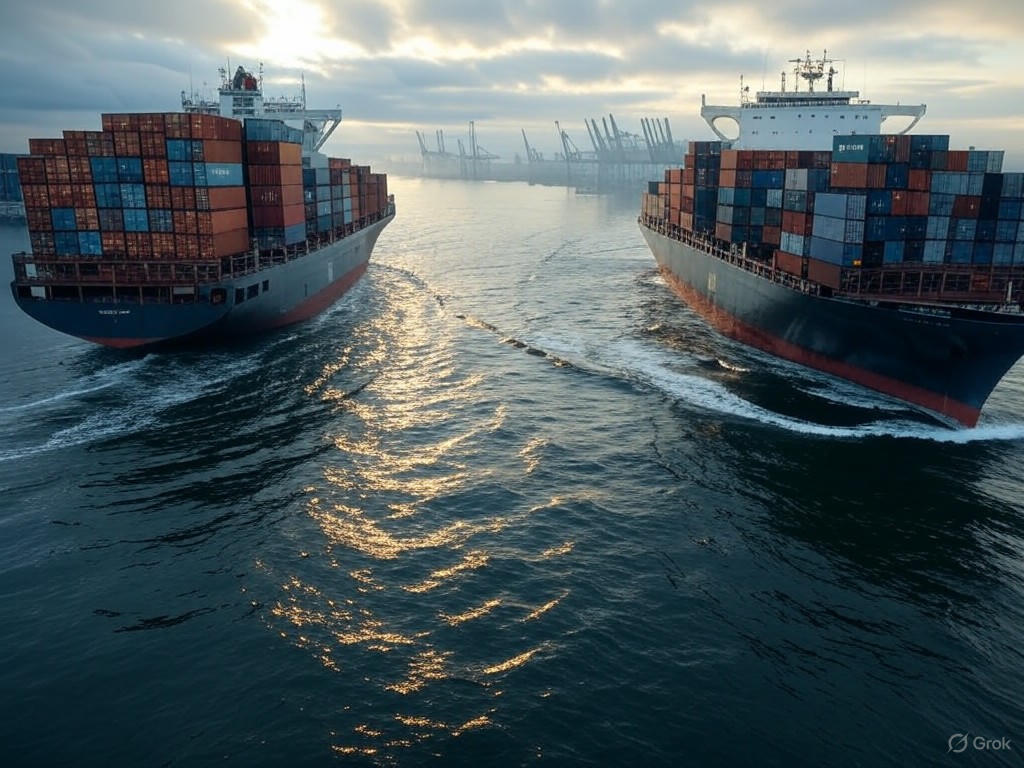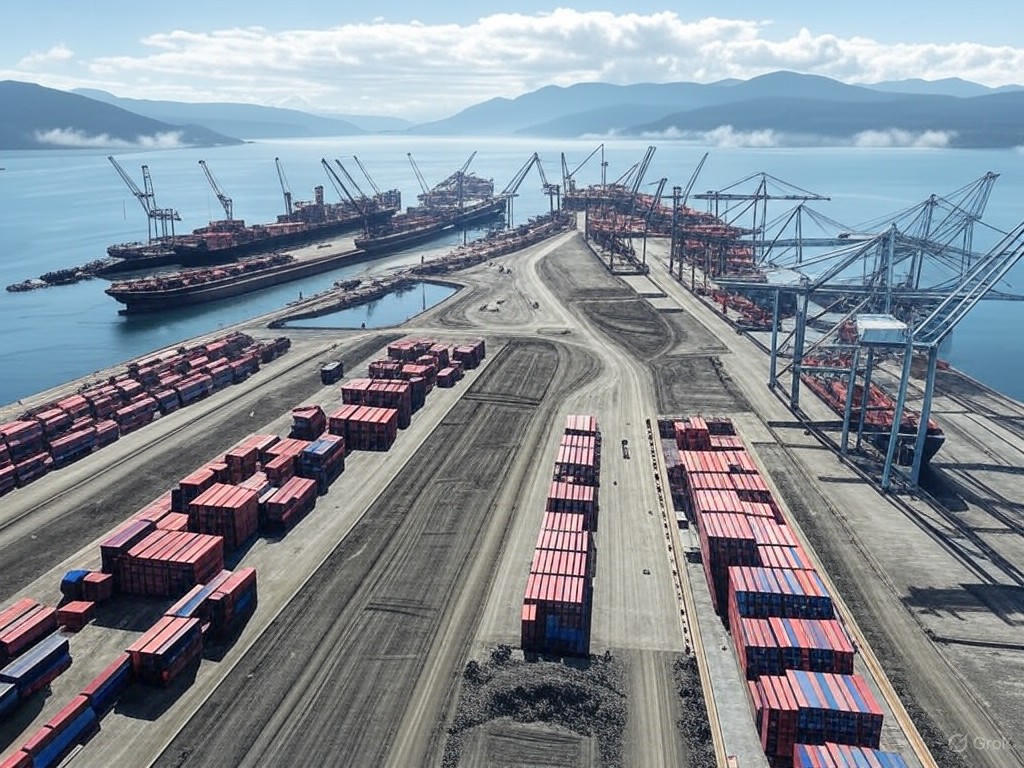BC’s Ports: Strategic Assets in Global Trade Wars
In an era where global commerce resembles a high-stakes chess game, British Columbia’s ports stand as formidable pieces on the board. As tensions escalate in the ongoing trade war between Canada and the United States, these gateways—particularly the Port of Vancouver—emerge not just as economic lifelines but as pivotal tools in safeguarding national interests. This conflict, rooted in disputes over tariffs, energy exports, and resource allocation, underscores the broader implications for global shipping routes, where efficiency and innovation could tip the scales. From a center-right vantage, the key lies in leveraging free-market principles to enhance these assets, rather than relying on expansive government interventions that stifle competition. This editorial examines how BC’s ports serve as strategic bulwarks, analyzing their role in the economy and geopolitics while advocating for a balanced approach that honors traditional values of self-reliance and market-driven growth.
The Evolving Landscape of Trade Wars and BC’s Strategic Role
British Columbia’s ports, including Vancouver and Prince Rupert, have long been cornerstones of Canada’s export economy, handling everything from lumber and grain to oil and minerals. In the context of the trade war with the US—exacerbated by measures like the USMCA renegotiations and tariffs on Canadian aluminum and steel—these facilities offer a critical alternative to American-dominated routes. Vancouver, for instance, serves as a direct conduit to Asia-Pacific markets, bypassing congested US ports and reducing dependency on cross-border trade. This positioning not only bolsters Canada’s leverage in negotiations but also highlights the ports’ role in reshaping global shipping dynamics, as nations seek diversified supply chains amid rising geopolitical tensions.

Container ships weave through Vancouver Harbor, illustrating the port's vital role in rerouting global trade away from US dependencies.
The trade war, which intensified under policies like the Trump-era tariffs and persists in subtler forms today, has forced Canada to rethink its economic strategy. According to The Wall Street Journal, bilateral trade disputes have cost both nations billions, with Canada facing retaliatory measures that threaten its resource-based economy. BC’s ports, however, provide a buffer. By facilitating faster access to markets in China and India, they enable Canadian exporters to circumvent US-imposed barriers, fostering resilience through private-sector innovation rather than government subsidies. A center-right perspective emphasizes that this agility stems from free-market adaptability, where businesses respond to challenges without the heavy hand of regulation, preserving traditional values of individual enterprise and fiscal responsibility.
Analyzing Economic and Geopolitical Implications
Delving deeper, the economic ramifications of BC’s port strategy reveal a complex interplay of growth and vulnerability. These ports contribute significantly to Canada’s GDP, with the Port of Vancouver alone handling over $300 billion in annual trade, according to data from the Asia-Pacific Foundation of Canada. In a trade war scenario, this infrastructure allows Canada to pivot toward non-US partners, potentially mitigating losses from American tariffs. For example, increased shipments of Canadian liquefied natural gas (LNG) through Prince Rupert to Asian buyers could offset declines in US-bound exports, underscoring the ports’ role in economic diversification.
Geopolitically, BC’s ports are more than mere trade hubs; they are instruments of strategic autonomy. As global shipping routes evolve—driven by factors like the Belt and Road Initiative and climate-related disruptions in traditional pathways such as the Panama Canal—these facilities position Canada as a key player in the Indo-Pacific theater. The Canadian Global Affairs Institute notes that enhanced port capabilities could counterbalance US influence, particularly in resource negotiations. Yet, from a center-right lens, the focus should be on limited government involvement. Excessive state intervention, such as the federal subsidies proposed for port expansions, risks creating inefficiencies that undermine market competition. Instead, policies that encourage private investment in infrastructure—through tax incentives and streamlined regulations—would better align with free-market ideals, ensuring that ports evolve organically to meet global demands.

Aerial view of the Prince Rupert Port expansion, symbolizing Canada's strategic push for diversified trade routes amid escalating geopolitical shifts.
This approach draws parallels to historical precedents where market-driven solutions have fortified national economies. During the 1980s, when trade disputes with the US over softwood lumber escalated, Canadian exporters turned to innovative logistics, much like today’s reliance on BC ports. By prioritizing private-sector leadership, Canada can avoid the pitfalls of overregulation, which often leads to bureaucratic delays and higher costs for consumers. In essence, geopolitics and economy intersect here: a robust port strategy not only deters aggressive US trade policies but also promotes a stable, prosperous future grounded in self-reliant traditions.
Evidence from Trade Data and Expert Insights
Empirical evidence underscores the strategic value of BC’s ports in this trade war. Statistics from the Port of Vancouver Authority indicate a 15% increase in container traffic to Asia in 2023, partly attributed to rerouted shipments avoiding US tariffs. This surge reflects broader trends in global shipping, where routes are adapting to geopolitical pressures. The Maritime Executive reports that BC ports have become essential for commodities like wheat and potash, with volumes rising as Canadian producers seek alternatives to US markets. Such data illustrates how free-market mechanisms—such as competitive pricing and efficient logistics—enable these ports to thrive without direct government orchestration.
Moreover, expert analyses highlight the risks of inaction. In a recent commentary, The Fraser Institute argues that Canada’s economic future hinges on reducing regulatory barriers, allowing ports to operate with greater flexibility. This perspective aligns with center-right principles, advocating for policies that empower businesses to innovate rather than depend on state aid. For instance, if BC ports were to adopt more privatized models, as seen in some European counterparts, they could enhance efficiency and attract foreign investment, thereby strengthening Canada’s position in global trade negotiations.
Yet, balance is crucial. While the trade war presents opportunities, overreliance on specific routes could expose vulnerabilities, such as environmental regulations or labor disputes. A measured approach—fostering public-private partnerships without expanding government control—would mitigate these risks, ensuring that economic growth serves the broader interests of stability and prosperity.
Toward a Visionary, Market-Led Future
In conclusion, British Columbia’s ports represent a beacon of strategic opportunity in Canada’s trade war with the US, with far-reaching implications for the global economy and geopolitics. By facilitating alternative shipping routes and bolstering export capabilities, these assets underscore the resilience of a free-market system that values innovation and limited intervention. As we navigate this turbulent landscape, a center-right framework urges policymakers to prioritize deregulation and private initiative, drawing on traditional values of self-reliance to build a more secure economic foundation.
Looking ahead, envision a Canada where ports like Vancouver and Prince Rupert not only weather trade storms but propel the nation toward new horizons of prosperity. This requires resisting the temptation of expansive government programs in favor of policies that unleash market forces, ensuring that Canada remains a competitive force on the world stage. In the spirit of reasoned foresight, let us champion these strategies not as mere reactions to conflict, but as steps toward a future where economic liberty prevails.

